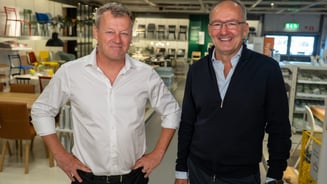IKEA recently earned the 8th spot on Forbes’ Best Employers list, the highest-ranked retailer globally. Ulrika Biesèrt, Chief People and Culture Officer at Ingka Group, IKEA’s largest retailer, puts it down to tangible practices that might surprise you, such as encouraging people to make mistakes, not asking for job candidates’ previous salary, and explicitly saying that IKEA might not be the place for everyone. Biesert says it’s practices like these, and many other, that help define and bring to life the company’s unique culture and values.
“Simply put, values guide actions, both short- and long-term. Culture is the environment. It creates a sense of belonging. For us, these are two of the most important elements of how we do business. This combination directs how we work together, innovate, show up in relevant ways for our customers, remain resilient as a business, and support co-workers”
– Ulrika Biesèrt, Chief People & Culture Officer at Ingka Group
“Simply put, values guide actions, both short- and long-term. Culture is the environment. It creates a sense of belonging. For us, these are two of the most important elements of how we do business. This combination directs how we work together, innovate, show up in relevant ways for our customers, remain resilient as a business, and support co-workers,” Biesèrt says.
We asked for her top tips on keeping the culture and values of 80-year-old IKEA top of mind for Ingka Group’s 165,000 co-workers across 31 markets. Here is what she shared:
1. Business bottom line
I am purposely listing this first, it is our “why”. Gone are the days where HR was a side-function to the “real business”. Being in the retail industry, the most important part of our business is people. This means our People & Culture function is core to everything we do.
We know having a healthy, thriving and resilient business comes down to them. Happy co-workers = healthy business. We now have data showing that customers have a more positive shopping experience, which tends to lead to higher purchases and more returning customers, in stores where co-workers are feeling more fulfilled, listened to, supported to develop, and can share feedback freely.
2. Clarity of Values
While values can never be only listed on the wall, it is also important that everyone is clear on what they are. They are the foundation of our business, and the compass that guides our daily actions and long-term goals. In my career, when we have been faced with a tough situation, like the Covid pandemic for example, it has been our values we turn back to. The two questions I tend to ask myself, is this good for our business in the short- and long-term and is this good for our co-workers in the short- and long-term. I tend to find the way forward becomes clear when you look to your values for guidance.
We have eight values that our business is built on: togetherness, caring for people and planet, cost-consciousness, simplicity, renew and improve, different with a meaning, give and take responsibility, lead by example.
3. Values-based recruiting and development
These values also guide us in our recruitment. We are far more interested in who you are than if you have the best CV for the role. We can teach you most skills, but if you are not aligned with our values IKEA won’t be the best place for you to be.
Our annual end of year review also takes into account how you do your job. In fact, it is 50% what you do and 50% how you do it. If you are a top performer, hitting all your business KPIs but you are doing it at the expense of our culture and not living to our values, IKEA isn’t the place for you. But if you are trying and showing up in a great way each day, we are happy to invest time into developing your skill set.
4. Inclusivity
We need to be a business that reflects the communities we operate in, and who our shoppers are. Being as inclusive as possible is also just the right thing to do. It does take time and requires consistency.
When you have co-workers who feel like they can be themselves at work it can lift away stress of downplaying any parts of your identity – an energy and emotional drain. This means that co-workers are, first of all, probably having a better time at work, but that they can also focus more of their energy on work.
Actions we take include succession planning, leadership development acceleration, annual pay-gap reporting, unconscious-bias training, and addressing obstacles that impact specific groups, for example childcare or parental leave to help keep women in the workforce. Just last week, on World Menopause Day, we launched our global guidelines that support co-workers during this phase of life.
We take a market-by-market approach, to ensure we are taking the actions that can have the biggest impact for the most people.
5. Goal Setting and Measurement
Goal setting is an effective tool. Particularly to accelerate inclusivity work. Along with an ambitious goal, we also need leadership support, and the right people in the business to help you create the change you want to make.
We have made good progress with (binary) gender balance, with 48% of our country CEO’s and 50% of managers being female. We started this journey more than 20 years ago – so it does take time. We still have further to go with our intersectionality work, ethnicity and race representation, and disability inclusion.
6. Empowerment through Psychological Safety
Our founder was always very clear that people do better when they can speak up, be themselves, and are not afraid. I have never been afraid of speaking up and saying my mind. I know this won’t be the case for every single co-worker, but my team and I work hard every day to create an environment where this can be true.
We also encourage mistakes – as long as we learn from them. A few years ago, our CEO Jesper Brodin introduced a ‘Go-Bananas’ card. Every co-worker has one, and it is essentially a pre-signed permission slip to try something new and daring, and Jesper has confirmed in advance that you will have a friend in him if it doesn’t work out.
7. Leadership
Leadership for us is a mindset, not a position. We see all co-workers as leaders, if they want to be. We look to leaders who role-model our cultures and values. When I look back at the list of points I have shared above, leadership is central to all of them.
As we look ahead, our commitment to a values-driven culture and inclusive leadership will continue to be at the heart of our business. Putting people first and empowering our co-workers to grow, innovate and show up for our customers.
About Ingka Group
With IKEA retail operations on 31 markets, Ingka Group is the largest IKEA retailer and represents about 90% of IKEA retail sales. It is a strategic partner to develop and innovate the IKEA business and help define common IKEA strategies. Ingka Group owns and operates IKEA sales channels under franchise agreements with Inter IKEA Systems B.V. It has three business areas: IKEA Retail, Ingka Investments and Ingka Centres. Read more on www.Ingka.com.
Media enquiries
For further information, journalists and media professionals can contact us at [email protected] or by calling +46 70 993 6376.














